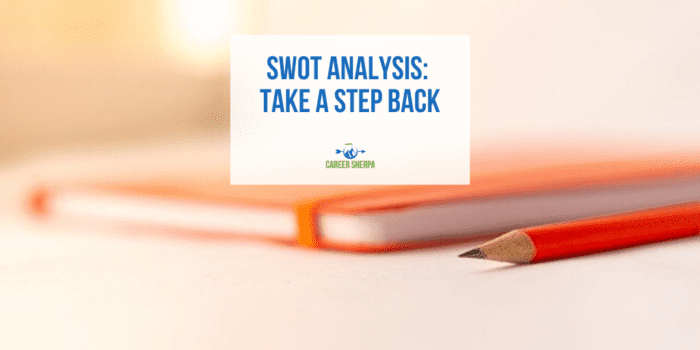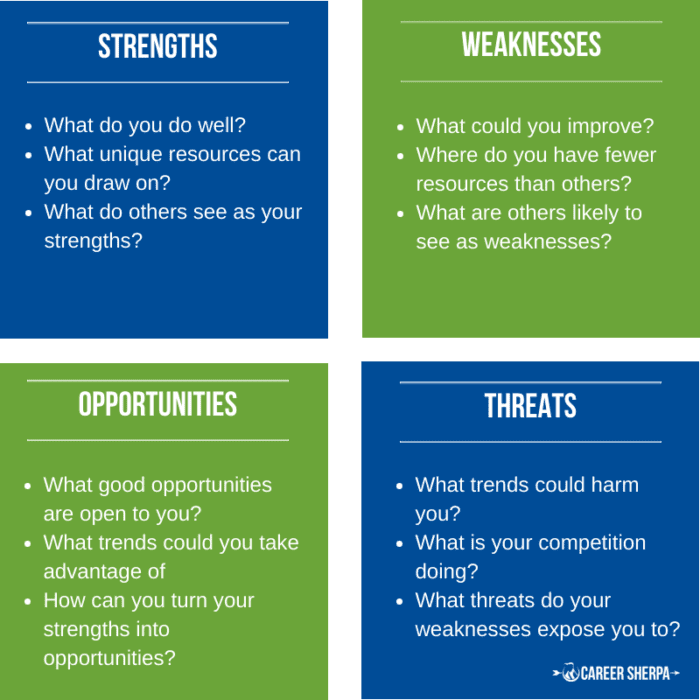Sometimes it helps to take a step back during your job search and do some analysis and assessment. SWOT can be an ideal model to use.

When you are too close to something it is difficult to identify opportunities for improvement.
This is probably the case for your job search. Let’s take a step back and look at how you’re positioning yourself in the job market.
If you’re not making the headway you want in your job search, and feel like you’ve done everything possible to find a job, take a break.
Take A Look At Your Progress
First, evaluate the progress you’ve made during your job search and what you’ve achieved. Answer these questions and see just how far you’ve come:
- How many new people did you meet?
- Did you learn any new technology?
- Who have you helped along the way?
- What have you learned over the past few months?
Does this generate some positive feelings? It should. But you still have work to do.
SWOT Analysis
A SWOT Analysis is used to help organizations develop a deeper awareness of all the factors involved in making a business decision.
That decision could be the launch of a new product or service, moving the company in a different direction, where to invest more time and talent or just an annual check in to evaluate where they stand.
It’s a strategy to help a company evaluate itself in four areas related to business competition or project planning.
Using the SWOT Analysis structure can help you evaluate how you are perceived in the job market and make adjustments so you are more competitive.
Conduct A SWOT Analysis On You
Completing a SWOT analysis enables you to analyze your vision and goals, and to plan your job search realistically.
This analysis also enables you to specify additional ways you could mitigate weaknesses and threats. Or in other words, identify ways you can bridge gaps between your current level and where you would like to be in the future. Additionally, you can strategically leverage personal and market strengths and opportunities.
Understanding your strengths and weaknesses will help you better align with job opportunities.

What are your strengths?
Your strengths differentiate you. These are hard and soft skills, knowledge or other aspects that allow you to stand out. What do others see as your strengths? What types of tasks do you do well? What sets you apart?
- Where do you add value?
- Specific experience
- Industry knowledge
- Education / Certifications
- Workstyle
- Initiative / leadership
- Soft skills
- Hard skills (or power skills)
Where are your weaknesses?
Do you have areas of weakness or are there aspects of your qualifications you have doubts around? What could you improve? Where do you have fewer resources than others? What might others see as your weakness?
- Gaps in capabilities
- Lack of competitive strength
- Reputation, presence and reach
- Known vulnerabilities
- Plan implementation
- Morale, commitment, leadership
- Accreditations
- Processes and systems
- Strategic thinking
What are your opportunities?
Are there opportunities can you take advantage of? What trends are working in your favor or can you take advantage of? Are there other ways you can turn your strengths into opportunities?
- Market demand
- New technologies, services, ideas
- Contracts
- Economy
What are your threats?
Evaluate threats by asking these questions. What trends could harm you? What does your competition look like (other job-seeking candidates looking for similar work) and what are they doing? How will your weaknesses threaten you?
- Market demand
- New technologies, services, ideas
- Obstacles faced
- Economy
Reboot
Take time to analyze where you stand in comparison to the competition (job seekers applying for the same job). This helps you understand what adjustments you’ll need to make and what you need to show and do to beat them. Based on your SWOT Analysis, how will you reboot your job search strategy? Will you?
- Highlight specific strengths?
- Uplevel your skills?
- Look at new types of opportunities?
- Update your LinkedIn profile?
- Network more?

Hannah Morgan speaks and writes about job search and career strategies. She founded CareerSherpa.net to educate professionals on how to maneuver through today’s job search process. Hannah was nominated as a LinkedIn Top Voice in Job Search and Careers and is a regular contributor to US News & World Report. She has been quoted by media outlets, including Forbes, USA Today, Money Magazine, Huffington Post, as well as many other publications. She is also author of The Infographic Resume and co-author of Social Networking for Business Success.
